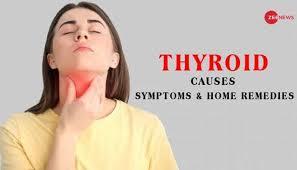Chapter 6: Understanding Hypothyroidism: When
Your Thyroid Slows Down
Causes and Risk Factors of Hypothyroidism Hypothyroidism occurs when the thyroid gland fails to produce and release sufficient thyroid hormones, leading to a slowdown in metabolic processes. Several factors can contribute to the development of hypothyroidism:
Autoimmune Thyroiditis (Hashimoto's Disease): This is the most common cause of hypothyroidism. It occurs when the immune system mistakenly attacks the thyroid gland, resulting in inflammation and impairment of thyroid function.
Iodine Deficiency: Iodine is an essential nutrient required for the synthesis of thyroid hormones. Inadequate dietary intake of iodine can lead to hypothyroidism, although this cause is relatively rare in regions where iodine is routinely added to salt or food.
Thyroid Surgery or Radioactive Iodine Treatment: Surgical removal of the thyroid gland or treatment with radioactive iodine, commonly used for hyperthyroidism, can result in hypothyroidism if the remaining thyroid tissue is insufficient to produce the necessary amount of hormones.
Medications and Other Factors: Certain medications, such as lithium and amiodarone, can interfere with thyroid hormone production. Other factors, including radiation therapy to the neck or certain genetic conditions, can also increase the risk of hypothyroidism.
Common Symptoms of Hypothyroidism
Hypothyroidism manifests in a variety of symptoms, which can vary in severity among individuals. Some of the most common symptoms include: Fatigue and Weakness: Individuals with hypothyroidism often experience persistent fatigue, weakness, and a general lack of energy.
Weight Gain: Slowed metabolism can lead to unexplained weight gain or difficulty losing weight, despite maintaining a healthy diet and exercise routine.
Cold Intolerance: Hypothyroidism can impair the body's ability to regulate temperature, making individuals more sensitive to cold environments.
Dry Skin and Hair: The skin may become dry, rough, and itchy, while hair may become brittle, dry, and prone to breakage.
Mood Changes: Hypothyroidism can affect mood, leading to symptoms such as depression, irritability, and difficulty concentrating.
Muscle and Joint Pain: Some individuals may experience muscle aches, stiffness, and joint pain.
Complications and Long-Term Effects of Hypothyroidism Untreated or poorly managed hypothyroidism can lead to various complications and long-term effects:
Cardiovascular Issues: Hypothyroidism can increase the risk of heart disease, including high blood pressure, high cholesterol levels, and an increased likelihood of developing heart disease.
Mental Health Concerns: Depression, cognitive impairment, and memory problems may occur as a result of hypothyroidism.
Infertility and Pregnancy Complications: Hypothyroidism can interfere with fertility and increase the risk of complications during pregnancy, such as preeclampsia, preterm birth, and developmental issues in the baby.
Myxedema: In severe cases of untreated hypothyroidism, a life-threatening condition called myxedema can occur. Symptoms include extreme fatigue, low body temperature, swelling, and altered mental state.
Diagnosis and Treatment Options for Hypothyroidism Diagnosing hypothyroidism involves a combination of clinical evaluation, symptom assessment, and laboratory tests. Common diagnostic tests include measuring thyroid-stimulating hormone (TSH) levels and thyroid hormone (T3 and T4) levels in the blood.
Once diagnosed, hypothyroidism can typically be managed through lifelong hormone replacement therapy. Synthetic thyroid hormones, such as levothyroxine, are prescribed
to restore hormone levels in the body. Regular monitoring of hormone levels and adjustments to medication dosage are usually necessary to achieve optimal thyroid function.
In addition to medication, maintaining a healthy lifestyle, including a balanced diet and regular exercise, can support overall thyroid health. It is important for individuals with hypothyroidism to work closely with healthcare professionals to monitor their condition, manage symptoms effectively, and ensure long-term well-being.
People Also Asked Questions:
Q: What is hypothyroidism, and what are its common symptoms?
A: Hypothyroidism is a condition where the thyroid gland doesn't produce enough thyroid hormones. Common symptoms include fatigue, weight gain, cold sensitivity, dry skin, and hair loss.
Q: What are the potential causes of hypothyroidism?
A: Hypothyroidism can be caused by autoimmune disorders (Hashimoto's thyroiditis), iodine deficiency, certain medications, or radiation therapy to the neck.
Q: How is hypothyroidism diagnosed and treated?
A: Blood tests, specifically measuring TSH and thyroid hormone levels, are used to diagnose hypothyroidism. Treatment often involves taking synthetic thyroid hormones (levothyroxine) to replace the missing hormones and restore balance.





